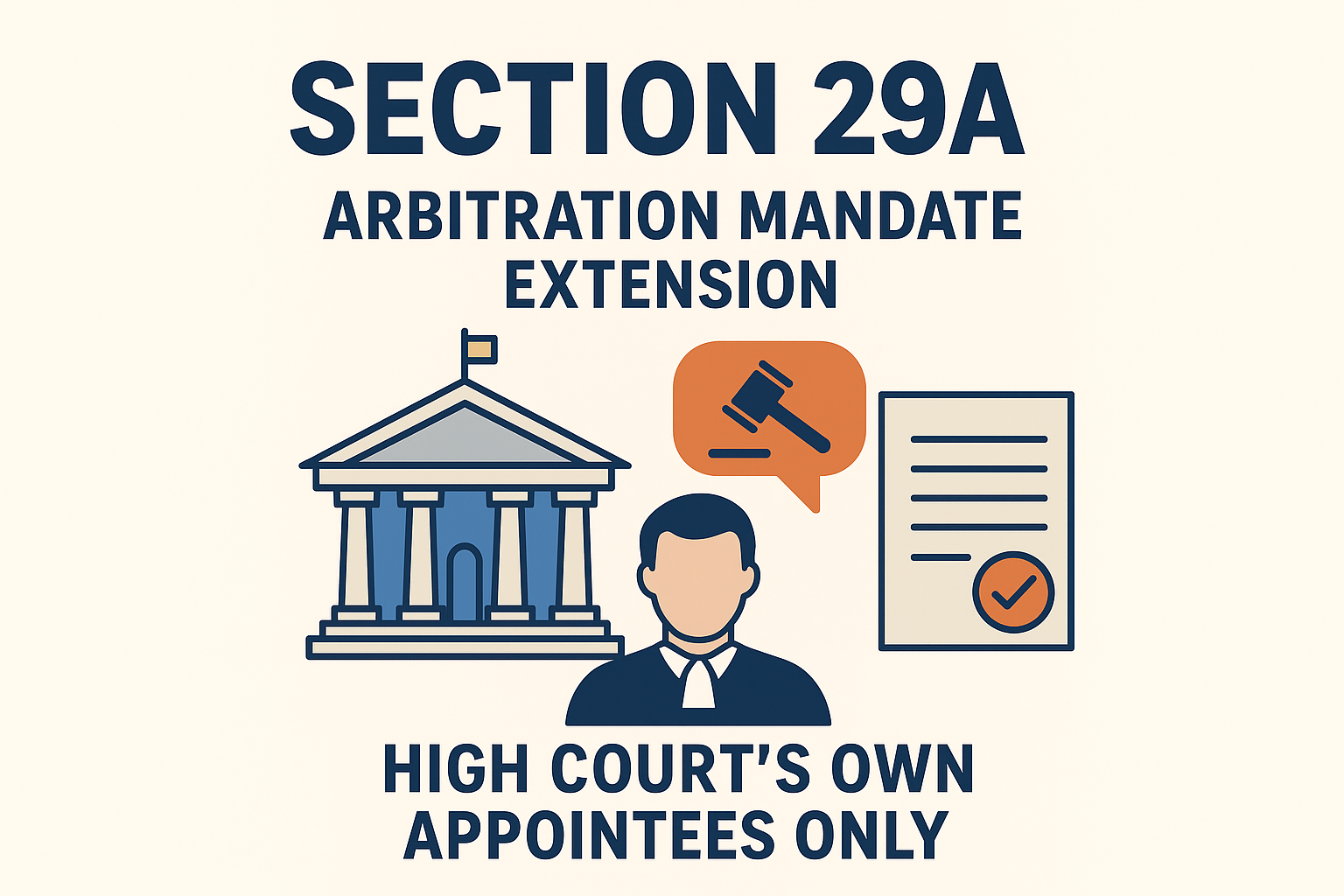View News
Section 29A Arbitration Mandate Extension: High Court’s Jurisdiction Limited to Its Own Appointees

Section 29A Arbitration Mandate Extension: High Court’s Jurisdiction Limited to Its Own Appointees
Introduction
Arbitration has emerged as a preferred mode of dispute resolution in India due to its efficiency, cost-effectiveness, and emphasis on party autonomy. Yet, delays in concluding arbitral proceedings have been a persistent criticism. To address this concern, the Arbitration and Conciliation (Amendment) Act, 2015 introduced Section 29A, which sets strict timelines for the completion of arbitration and delivery of the award.
While the legislative intent behind Section 29A is clear—imposing discipline and certainty in arbitral timelines—its application has generated jurisdictional debates, particularly regarding which court has the authority to extend an arbitrator’s mandate once the statutory period lapses.
Judicial interpretation has consistently clarified that only the High Court that appointed the arbitrator under Section 11 of the Act can entertain an application under Section 29A(4). In other cases, the competent Commercial or Civil Court, as defined in Section 2(1)(e), is the appropriate forum.
Understanding Section 29A of the Arbitration Act
Section 29A introduces a statutory deadline for arbitral awards. The key features are:
-
The arbitral tribunal must deliver the award within 12 months from the date of completion of pleadings under Section 23(4).
-
By mutual consent of the parties, the mandate may be extended by an additional six months.
-
Beyond this, the arbitrator’s mandate automatically terminates, unless an application for extension is made to the court under Section 29A(4).
-
The court may grant an extension, impose conditions, or even substitute the arbitrator.
This provision ensures judicial oversight while promoting timely completion of proceedings.
Jurisdictional Question Under Section 29A(4)
Section 29A(4) empowers “the Court” to extend the arbitrator’s mandate. The definition of “Court” under Section 2(1)(e) includes:
-
The principal Civil Court of original jurisdiction, or
-
The High Court with original jurisdiction over the arbitration’s subject matter.
However, courts have drawn a clear distinction based on who appointed the arbitrator:
-
If the High Court appointed the arbitrator under Section 11, it retains jurisdiction to consider an application under Section 29A(4).
-
If the arbitrator was appointed by the parties themselves, or through an arbitral institution, the Commercial Court/Civil Court is the proper forum.
This ensures adherence to the procedural hierarchy and avoids burdening High Courts with unnecessary applications.
Judicial Interpretation and Key Case Laws
Indian courts have reinforced this jurisdictional approach through multiple rulings:
-
NHAI v. Gammon Engineers (Delhi High Court): The Court held that it lacked jurisdiction under Section 29A if the arbitrator was not appointed under Section 11 by the High Court.
-
Cabra Instalaciones Y Servicios SA v. MSEDCL (Bombay High Court): Reiterated that the court which appointed the arbitrator alone has jurisdiction to extend the mandate.
The consistent stance across jurisdictions balances two competing principles—minimal judicial interference in arbitration and the need for judicial supervision to prevent abuse of process.
Practical Implications for Parties and Practitioners
The interpretation of Section 29A has direct consequences for litigants and counsel:
-
Strategic Arbitrator Appointment: Parties preferring High Court oversight on extensions must seek appointment under Section 11.
-
Correct Forum for Applications: If the arbitrator is appointed by agreement or institution, extension petitions must be filed before the Commercial/Civil Court, not the High Court.
-
Avoiding Procedural Errors: Filing before the wrong forum risks dismissal or delay, leading to termination of the arbitrator’s mandate.
-
Strict Timeline Management: Both parties and arbitrators must monitor deadlines diligently to safeguard proceedings from lapsing.
Conclusion
Section 29A was designed to enhance the efficiency and credibility of arbitration in India. However, its success depends on strict procedural compliance and clarity of jurisdiction. Judicial interpretation has firmly established that:
-
Only the High Court that appointed the arbitrator under Section 11 can extend the mandate under Section 29A(4).
-
In all other cases, the Commercial/Civil Court under Section 2(1)(e) is the competent forum.
This maintains the balance intended by the Arbitration Act, prevents misuse of higher forums, and emphasizes the importance of strategic decisions during the appointment stage. For practitioners, awareness of these nuances is crucial to protecting client interests and upholding the integrity of arbitral proceedings in India.
"Unlock the Potential of Legal Expertise with LegalMantra.net - Your Trusted Legal Consultancy Partner”
Disclaimer: Every effort has been made to avoid errors or omissions in this material in spite of this, errors may creep in. Any mistake, error or discrepancy noted may be brought to our notice which shall be taken care of in the next edition In no event the author shall be liable for any direct indirect, special or incidental damage resulting from or arising out of or in connection with the use of this information Many sources have been considered including Newspapers, Journals, Bare Acts, Case Materials , Charted Secretary, Research Papers etc
Prerna Yadav
LegalMantra.net

